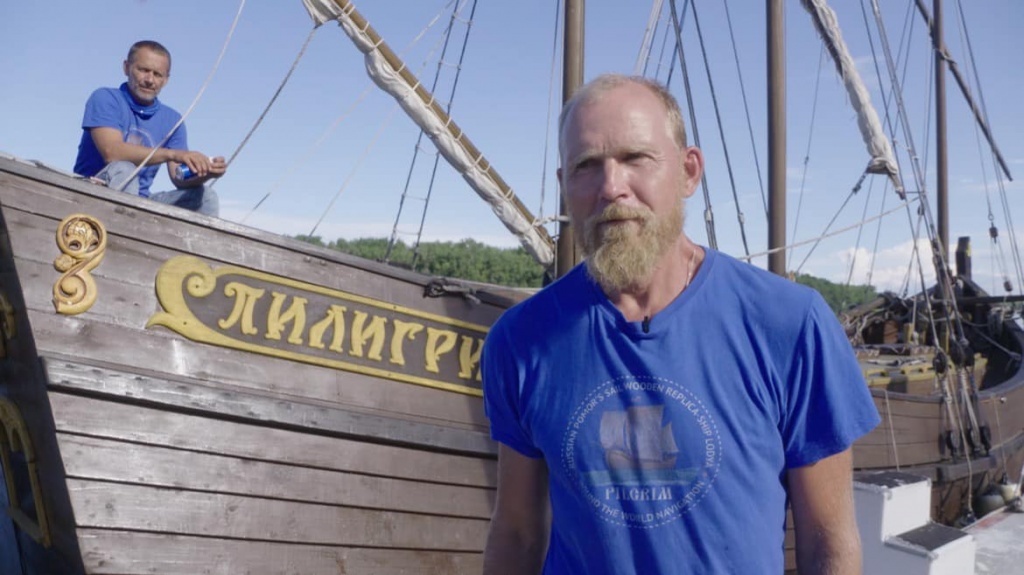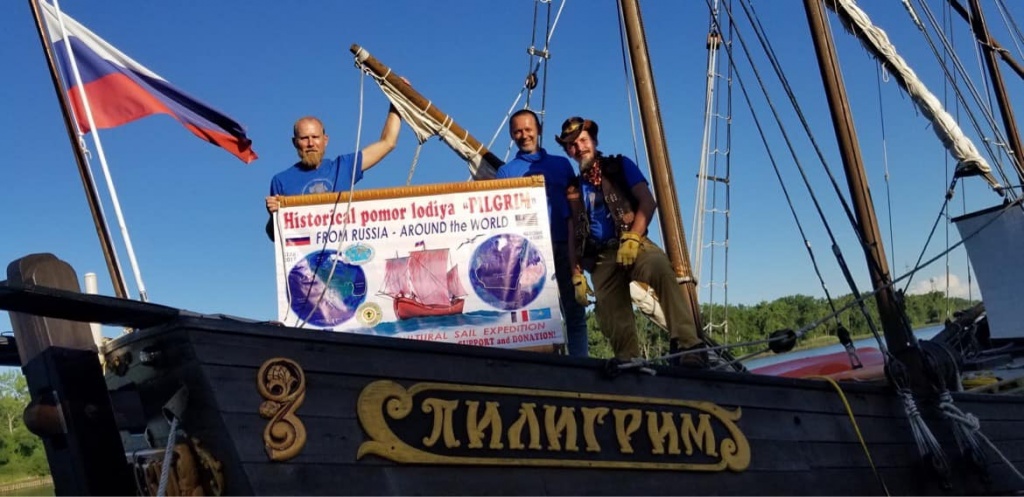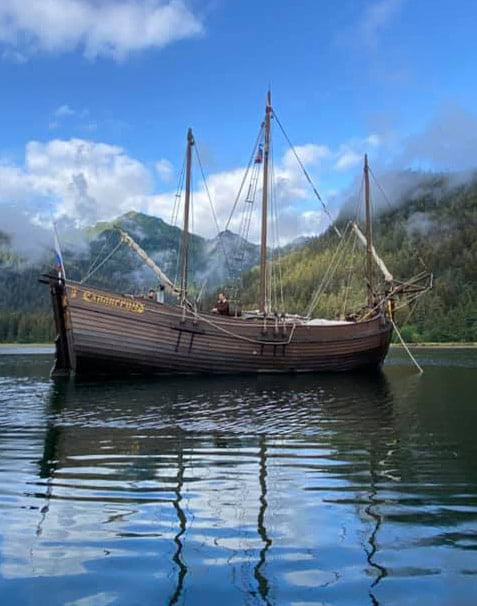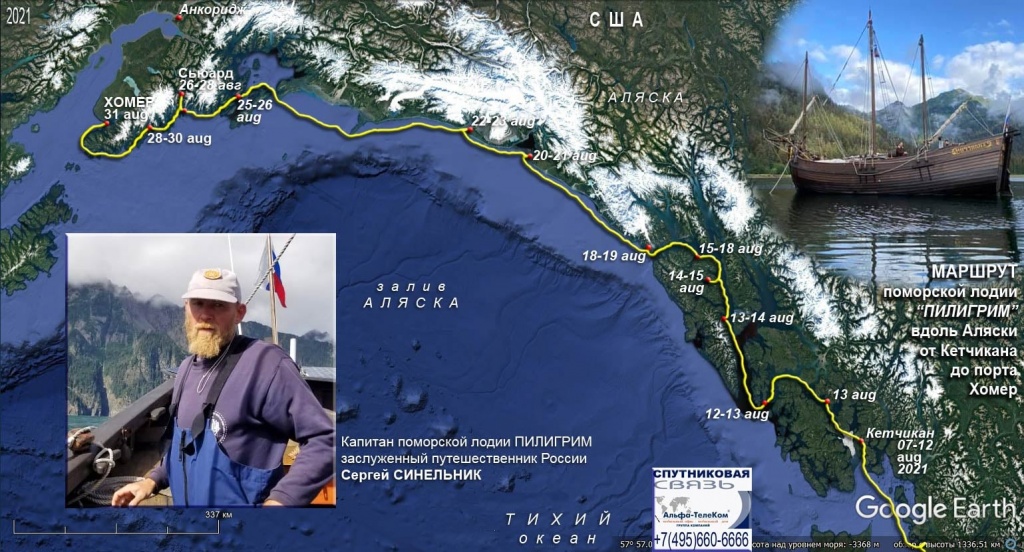
“Captain, we’re going down!” Slavic longboat reaches Alaska
/ Главная / Russkiy Mir Foundation / Publications / “Captain, we’re going down!” Slavic longboat reaches Alaska“Captain, we’re going down!” Slavic longboat reaches Alaska
Sergey Vinogradov

On the Pilgrim
Summers in Alaska are short. And the breath of winter is felt from early fall. Famous Russian traveler Sergey Sinelnik knows this better than most people. Since 2019, he has been sailing on an exact replica of the medieval Slavic longboard named Pilgrim. The journey has taken him to the northernmost American state. This year's voyage is over; next spring, Sinelnik and his crew will sail along the Northern Sea Route to Russia
Sailing across the Atlantic Ocean, as well as American and Canadian rivers and lakes, hauling the Pilgrim across the United States on a truck, wintering in Minnesota, and "acting" as a floating museum in Seattle are the things of the past now. There were also many meetings with compatriots and Americans who expressed their delight about the Russian boat and its crew without reserve.
The captain of the Pilgrim told the Russkiy Mir about the sailing performance of this longboat, Matushka Island, other Russian traces in Alaska, and also what surprised the seasoned American yachtsman who found himself in a Russian boat.
Read also about Sergey Sinelnik: Across the oceans in old Russian boat
Fall is a stormy season
– Sergey, where is Pilgrim riding at the moment?
– Now we are in Homer, Alaska, not far from Anchorage. We didn't go to the city of Anchorage because there are no moorings for small boats, only big ships can moor there. And Homer is a big fishing base; it is near Kadiak (the island, which in the XVIII and XIX centuries was actively developed by Russian fishermen - auth.). This year we will not go further, we do not have time. At sea we should not be reckless; we should be able to wait. Otherwise, we may perish and sink the boat. Fall is a stormy season in the Aleutian Islands and the Bering Sea.
If we wait for the storm to pass, we will lose time and go to Chukotka closer to frosts. Plus, it is required to assemble a team. We reached Homer together with old friends, and new ones came. But there is still no one to continue the trip with. This is God's Providence. You know, when you rely on the Lord, everything works out miraculously.

Sergey Sinelnik with crew members
– Will you spend the winter in Alaska?
– The scow will remain. I am going back to Russia and will come here again in April., when we're going to prepare the boat for navigation together with my longtime assistant Alexey Volchok. Maybe someone else from the team will join. Our plans are to reach Chukotka did not work out this year.
– How was the Pilgrim in the northern seas and rivers?
– I cannot say that I am completely satisfied. The scow has its drawbacks. Before that, we went on the Rusich boat. It is a copy of a Novgorod vessel from about the 10th century. We went to India and South Tasmania, as well as around Europe. Its board sides were low, and this gave it an advantage. The scow was stable; I liked its behavior in bad weather. As to the Pilgrim, there are better conditions inside, so that one could stand tall, although it was to the prejudice of seagoing performance. The Rusich was kind of roomless inside - you just crawl in to sleep. Now on the Pilgrim we have three cabins, a wardroom, and a small museum. I understood that the high board sides, stern, and bow create additional windage of the hull, and the set of sails is small - only 130-140 centimeters. Accordingly, it will wind and rock more. It turned out to be a tender boat, but over time you get used to rocking.
– Has the boat passed the storm test?
– In Alaska, the winds are ever-changing. You need to wait often. We got into a wind of about 40 knots, and the sea waves were 3 to 5 meters. It was rocking, but bearable. The main thing is to be like an acrobat on board, flexible, and clinging. This is why exists waddling "rolling sailor" gait.
– You can't protect yourself against the force of nature. What about the pandemic? How much does it interfere with the journey?
– One option was to sail across the Pacific Ocean. We had to disregard this option due to the pandemic as many countries were closed, including Canada. When we sailed from Seattle along the west coast, the Canadians allowed us to pass but only in transit - no mooring. We were not allowed to use the piers. If there was a strong current or headwinds, it was allowed to anchor in some places without going ashore.
Russian America
– Can Russian traces be felt in Alaska?
– Of course they can, even by name. For example, there are islands named after Baranov and Chichagov. Or you look at the map, and there is a small island called Matushka ("mother" in Russian), or Izmailov, or Pogibshiy (Dead) Cape. It means that someone died there once. And there are many churches that have survived here since the time of St. Herman of Alaska (died in 1836 - author) - many local residents profess Orthodoxy.
Yesterday Russian Old Believers came to visit us. They live in three villages not far from Homer. They were very hospitable and invited us to their place. They moved here from Brazil, Bolivia, and Oregon. Interesting meetings take place on the way; the boat connects people, we exchange cultures, history. And the people you meet are real treasures; you can’t help but admire them!
– Have you met with the natives of Alaska?
– Yes, of course, many of them hunt and fish. They are interesting people. We met one of them yesterday, got to know each other. There is a walrus skull in his car and skins – he is a real hunter. The majestic beauty of the North is not comparable to any southern islands, but the places are quite wild. Sometimes you walk for three days – and there is no a single house. At the anchorages, you hear a wolf howl, bears walk along the shore. But our boat evokes positive emotions, brings joy, delight, and pleasant surprise to all the people we meet. And people bring us joy; it turns out to be mutual joy. We do not face negative attitudes.
Underway
– It's hard to surprise residents of port cities with a ship. And when the Pilgrim was "dragged" across several states, how did the people around it react?
– The reaction was always the same - surprise, interest. Our vessel's truck driver became a famous person. Probably he did not experience so many people coming up to him with questions in his entire life, as he did in five days while we were transporting the boat. Another illustration: we have three masts, a bowsprit, and sails, so the longboat attracts everyone's attention. And this is understandable – it is a charismatic ship that everyone admires. There are not so many wooden ships in general. They are a "bridge" to the past. Last year we went to Albany along the Hudson River. And there you have to go through the Erie Canal, something like 300 miles. We removed the masts. We thought we would become inconspicuous and take a break from attention. Sometimes you need to rest. It did not work out. We were traveling along the canal, people came out of their houses, left their cars on the bridge, run to take pictures. Children were scampering with delight. The interest was huge even without masts.
– Still, does such attention bring joy or fatigue?
– We have been engaged in expeditions for over 20 years. There was a time when the priority was the route and how to get from point A to point B quickly. And now the values have shifted. People and meetings have become more important and this is what “underway” means. The movement towards the goal is the goal itself. I began to understand this only after I had turned 40. “Here and now” is important, rather than “first we will go, and then”... No, we are going now, and this is important.
– Do you use state-of-the-art equipment on board or are you trying to keep up with historical realities?
– If we compare a modern yacht and a wooden replica vessel, they are they are incomparable in general, like a cart and a car. Everything is done in the manual way here. For example, it takes 15 to 20 minutes to raise the mainsail. When wind is strong, a lot of effort is required to manage guy lines. And steering is very difficult, especially when there is a wind and a large wave.
Our ship is wooden, platings are overlapped, and water flows inside. We constantly need to pump it out. Yachtsmen would be horrified by the way we sail. If the pump fails, water flows in quickly. Steve, an American yachtsman, was sailing with us. At night he reported: "Captain, we’re going down!" I saw the water in the hold. Things were floating. There was a heavy rolling, one pump jammed, and the other two were turned off, so the water came in. We turned on the pump, pumped out the water. And Steve still couldn’t calm down, so I told him to go and rest. "How to sleep if we are going down?” he responded.
Here is the answer to your question about historical realities... We do not set ourselves the task of plunging into the 18th century. We do stay in a museum, but sail the seven seas on the boat in the 21st century. Of course, we have a life raft, a small engine for maneuvering in canals and harbors, and a radio set.

To hear the man
– What does the Coast Guard think about the replica of a historic ship in the countries that you visit?
– Sometimes they come to us when we are approaching the U.S. borders. They give us information that we have to go through all the procedures within 24 hours. There are inspections in different countries, but they are rare. Historical replica ships are treated differently than others. We come to the harbor, and they think, “Ah, they are enthusiasts, the guys are crazy, why check them."
– You travel with multinational crews, plus have meetings on shore. How do you communicate?
– If one person wants to hear another, then he will make every effort to hear. And people can speak the same language and not understand each other. Therefore, it is important to be willing to hear, to pay attention to another person. Then you can always find a common language. I know English, however, not very well. But English is not spoken in many countries. A while back, my brother and I made nine expeditions to Africa – in some cases we communicated with our fingers, in others with facial expressions, or a smile.
– Do women take part in your sea voyages?
– Yes, it happens. We sailed across the Atlantic with my wife Marina and two sons, Yaroslav and Svyatoslav. When they left Petrozavodsk, one was 11 years old, the other 15. We covered ten thousand nautical miles. We traveled for two years. My wife used to be afraid of water, but she overcame her fears. She could stand on watch alone at night and raise heavy yards with sails. Children studied remotely on board when there was the Internet connection. They were behind the studies a little, but they got tremendous experience. When now I offer them to return to the boat as a joke, they say - no, there is a lot of work.

– Did your kids inherit your wanderthirst?
– The elder son studies in college to be a sea cook. He will sail on a ship, he is attracted by wanderings. The youngest one is still undecided, he still goes to school. Our daughter Elena used to sail with us. Now she studies in the art college in Moscow.
– Are you planning to travel to a ripe old age?
– As God will arrange. I've seen so much in my life, sailed tens of thousands of miles astern. A million kilometers have been driven and walked. While walking around the planet, I never cease to be surprised. It's great that this feeling doesn't go away.
New publications

 Mikhail Kalatozov, a director who transformed the world of cinematography in many ways, was born 120 years ago. He was a Soviet film official and a propagandist. Above all, he was capable of producing movies that struck viewers with their power and poetic language.
Mikhail Kalatozov, a director who transformed the world of cinematography in many ways, was born 120 years ago. He was a Soviet film official and a propagandist. Above all, he was capable of producing movies that struck viewers with their power and poetic language.  Ukrainian authorities have launched a persecution campaign against the canonical Ukrainian Orthodox Church (UOC), the biggest one in the country's modern history. Over the past year, state sanctions were imposed on clergy representatives, searches were conducted in churches, clergymen were arrested, criminal cases were initiated, the activity of the UOC was banned in various regions of the country, and monasteries and churches were seized.
Ukrainian authorities have launched a persecution campaign against the canonical Ukrainian Orthodox Church (UOC), the biggest one in the country's modern history. Over the past year, state sanctions were imposed on clergy representatives, searches were conducted in churches, clergymen were arrested, criminal cases were initiated, the activity of the UOC was banned in various regions of the country, and monasteries and churches were seized.  When Nektary Kotlyaroff, a fourth-generation Russian Australian and founder of the Russian Orthodox Choir in Sydney, first visited Russia, the first person he spoke to was a cab driver at the airport. Having heard that Nektariy's ancestors left Russia more than 100 years ago, the driver was astonished, "How come you haven't forgotten the Russian language?" Nektary Kotlyaroff repeated his answer in an interview with the Russkiy Mir. His affinity to the Orthodox Church (many of his ancestors and relatives were priests) and the traditions of a large Russian family brought from Russia helped him to preserve the Russian language.
When Nektary Kotlyaroff, a fourth-generation Russian Australian and founder of the Russian Orthodox Choir in Sydney, first visited Russia, the first person he spoke to was a cab driver at the airport. Having heard that Nektariy's ancestors left Russia more than 100 years ago, the driver was astonished, "How come you haven't forgotten the Russian language?" Nektary Kotlyaroff repeated his answer in an interview with the Russkiy Mir. His affinity to the Orthodox Church (many of his ancestors and relatives were priests) and the traditions of a large Russian family brought from Russia helped him to preserve the Russian language.

 The leaders of the Friends of the Great Russia cultural association (Amici Della Grande Russia) in Italy believe that the Western policy of abolishing Russian culture in Europe has finally failed. Furthermore, it was doomed to failure from the beginning.
The leaders of the Friends of the Great Russia cultural association (Amici Della Grande Russia) in Italy believe that the Western policy of abolishing Russian culture in Europe has finally failed. Furthermore, it was doomed to failure from the beginning.  Name of Vladimir Nemirovich-Danchenko is inscribed in the history of Russian theater along with Konstantin Stanislavski, the other founding father of the Moscow Art Theater. Nevertheless, Mr. Nemirovich-Danchenko was a renowned writer, playwright, and theater teacher even before their famous meeting in the Slavic Bazaar restaurant. Furthermore, it was Mr. Nemirovich-Danchenko who came up with the idea of establishing a new "people's" theater believing that the theater could become a "department of public education."
Name of Vladimir Nemirovich-Danchenko is inscribed in the history of Russian theater along with Konstantin Stanislavski, the other founding father of the Moscow Art Theater. Nevertheless, Mr. Nemirovich-Danchenko was a renowned writer, playwright, and theater teacher even before their famous meeting in the Slavic Bazaar restaurant. Furthermore, it was Mr. Nemirovich-Danchenko who came up with the idea of establishing a new "people's" theater believing that the theater could become a "department of public education."  "Russia is a thing of which the intellect cannot conceive..." by Fyodor Tyutchev are famous among Russians at least. December marks the 220th anniversary of the poet's birth. Yet, he never considered poetry to be his life's mission and was preoccupied with matters of a global scale. Mr.Tyutchev fought his war focusing on relations between Russia and the West, the origins of mutual misunderstanding, and the origins of Russophobia. When you read his works today, it feels as though he saw things coming in a crystal ball...
"Russia is a thing of which the intellect cannot conceive..." by Fyodor Tyutchev are famous among Russians at least. December marks the 220th anniversary of the poet's birth. Yet, he never considered poetry to be his life's mission and was preoccupied with matters of a global scale. Mr.Tyutchev fought his war focusing on relations between Russia and the West, the origins of mutual misunderstanding, and the origins of Russophobia. When you read his works today, it feels as though he saw things coming in a crystal ball...